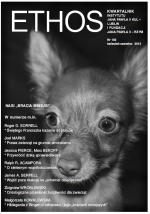 zobacz powiększenie | Maciej TROJAN, Agnieszka KACZMARCZYK, Justyna SZYMAŃSKA – How To Read an Animal Mind? Selected Problems of Comparative Psychology as an Example of Research on the Functions of the Mind and Intentionality of Animal Behavior Cena brutto: 7,00 PLN |
|
Recent studies on the minds of other species are associated with a variety of issues, including: social communication, language and numerical skills, production and use of tools, theory of mind, mental time travel, and consciousness. This text presents the current trends in research in the last three aspects of the functions of the mind – each of which is acquired by a human being in the early ontogeny, while there is a definite relationship between them. «Theory of mind» is a term for a specific cognitive ability. An individual has a theory of mind when it attributes mental states to itself and to others. Certainly, the lapse in time travel in animals is significantly narrower compared to man. However, it seems that animals have and use some form of personal memory of the past, namely, episodic-like memory. They also have abilities of anticipation and a planned behavior limited in time based on prospective memory. Finally, consciousness – a condition or ability to be conscious or aware of something but in its most complex form – is recognized by the person through their own actions and feelings, thus being aware of their own thoughts, insights, and other events taking place in their mind. Based on this kind of definition we can assume the existence of at least two kinds of consciousness. We can talk about perceptual awareness wherever there is a conscious perception, although the content of consciousness may be processing information to anticipate or recall past events. Animals with the ability of perceptual awareness not only react to stimuli, but intentionally select the appropriate response, based on the active processing of information. The second type is the awareness of self-centered consciousness that allows one to think about thinking, emotions, and perception, referred to as introspective consciousness. It is this kind of awareness that allows you to have a mental representation of yourself and others that has a direct relationship, and for some is even an essential component of mental time travel and theory of mind. Currently, it is believed that many species of animals, including all mammals, birds and other creatures – among them octopuses – use this form of consciousness. Keywords: comparative psychology, theory of mind, mental time travel, consciousness Contact: E-mail: maciej@psych.uw.edu.pl http://psychologia.pl/zpz/concrete/index.php/pracownicy/dr-maciej-trojan/ Pliki do pobrania: » 102.Trojan.content.pdf | |
